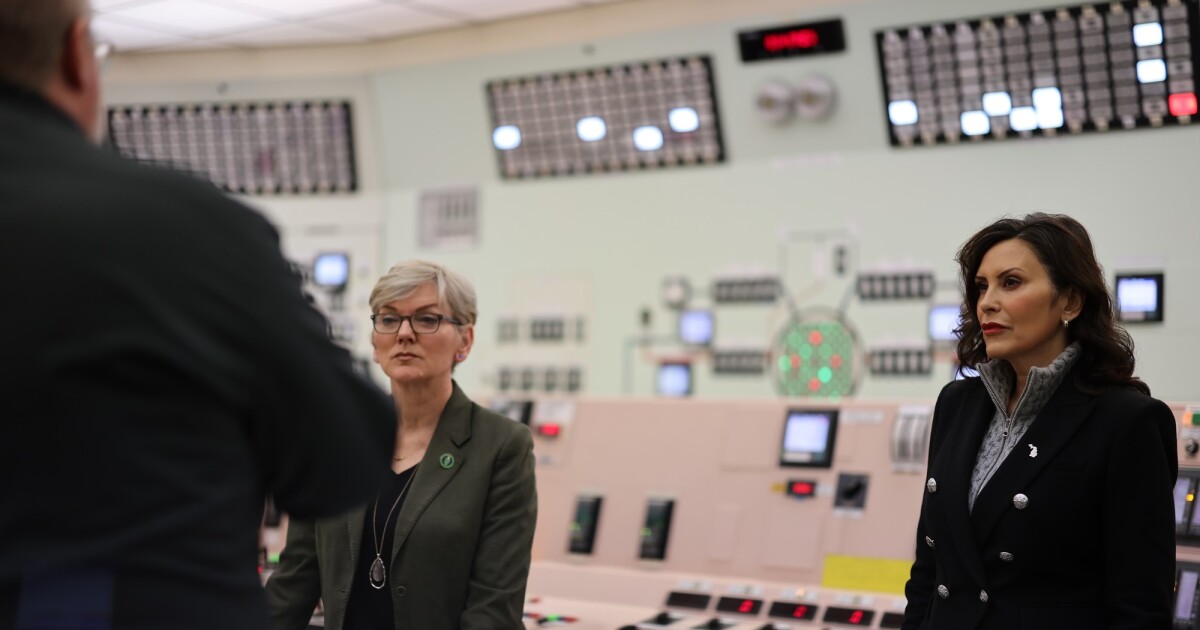$1.5 billion federal loan to restart Michigan nuclear plant marks a first
3 min read

The U.S. Department of Energy announced a $1.5 billion loan to
The loan, which received conditional approval from the DOE, is authorized under an
The 800-megawatt Palisades power plant along the shore of Lake Michigan, owned now by Holtec International LLC, was decommissioned in May 2022 by its former owner after being in service for 50 years. The DOE loan, if finalized, would repower the plant through 2051. The loan depends on Holtec meeting various conditions outlined in the not-yet-public term sheet, though the DOE said the “vast majority” of those who receive conditional loans reach financial close.
State of Michigan
Holtec also hopes to build a pair of 300 megawatt small modular reactors at the Palisades site, and
Michigan Gov. Gretchen Whitmer, who joined former Michigan governor and current DOE Secretary Jennifer Granholm last week at the site to announce the award, said “once complete, Palisades will become the first successfully restarted nuclear power plant in American history, protecting 600 union jobs at the plant, 1,100 in the community, and access to clean, reliable power for 800,000 homes.”
Michigan has also approved $150 million to support the recommissioned reactor and a long-term power purchase agreement hammered out last year calls for Michigan-based Wolverine Power Cooperative and its non-profit rural electric cooperative project partner, Hoosier Energy, to purchase all power from the plant.
Nuclear power accounts for about 20% of total U.S. electricity generation, though generation has declined slightly over the last few years, and more than 50% of clean electricity. The energy source remains controversial among some environmental critics, including energy advocacy nonprofit Beyond Nuclear, which has filed petitions to block the project along with other environmental groups. Kevin Kamps, the group’s radioactive waste specialist, said the Palisades project poses significant financial and safety risks.
The $1.52 billion loan “is a lot of money but it’s the tip of the iceberg,” Kamps said, saying Holtec has altogether requested $15.7 billion in subsidies for the decommissioned reactor and its two proposed SMRs. “More than half of that is for the half-century old zombie reactor,” he said.
Florida-based Holtec has never built or operated a nuclear plant, Kamps said, and previous owner, Entergy, closed the plant amid high operating costs and the expense of upgrading “long obsolete” systems.
Safety risks range from a “dangerously embrittled nuclear reactor pressure vessel” to overdue maintenance on systems to outdated components like critical steam generators, he said.
The renewed emphasis on nuclear power as a way to wean off fossil fuel energy echoes previous efforts under the George W. Bush administration, Kamps said. Of the three dozen nuclear projects that administration supported, only two —
“And here we go again; the magic word now is small modular reactors.”
The 2022 Inflation Reduction Act provides $30 billion in production tax credits to existing nuclear power plants from 2024 through 2032. The tax credits are designed to preserve existing nuclear infrastructure and are on top of $6 billion in the 2021 Infrastructure Investment and Jobs Act’s Civil Nuclear Credit Program, for nuclear units that might otherwise be set to retire.







